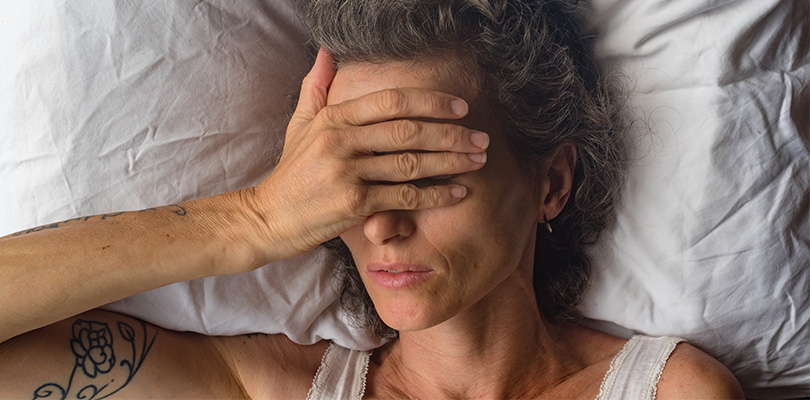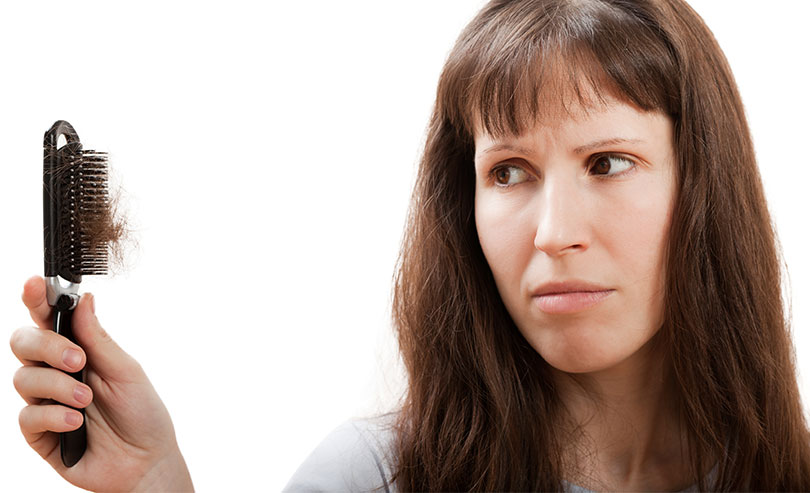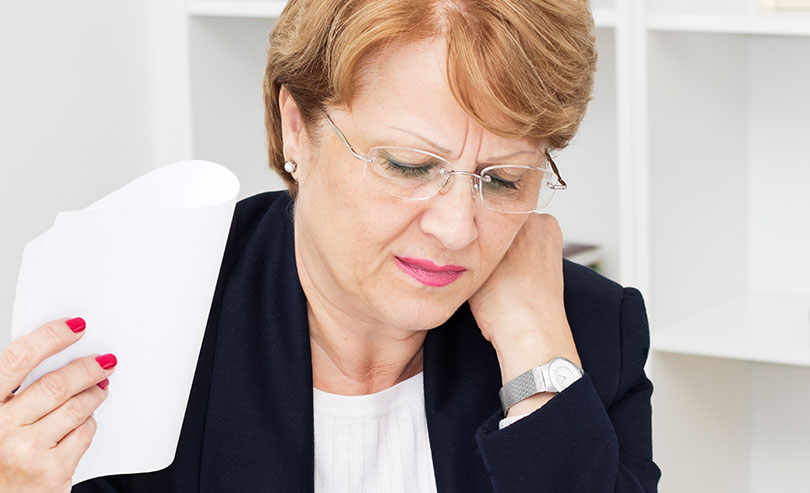Menopause and Insomnia
Are you a woman over 30 who has trouble sleeping through the night? Menopause may be to blame for your insomnia. Sleep disturbance is common through perimenopause, menopause and post-menopause.
Perimenopause takes place in a woman’s late 30s and 40s. Women reporting insomnia at this age may actually be starting their journey into menopause.
How Common Is Menopause and Insomnia?
Studies show increased likelihood of sleep issues during the menopausal transition, which is linked with hot flashes and sweats. Fluctuating levels of estrogen and progesterone can cause hot flashes in 85% of American women and over 60% of post-menopausal women report insomnia symptoms.
Once hot flashes and night sweats spark action on your part — for example, getting out of bed to change your clothes/sheets — it makes it difficult to get back to sleep because the more we move, the more we wake up.
Causes for Insomnia During Menopause
Hormones
Shifting hormone levels is a big culprit. During perimenopause, ovaries reduce their production of estrogen and progesterone (a sleep-promoting hormone). A decline in these hormones can contribute to the inability to fall asleep. Less estrogen may make you more prone to environmental factors and stressors and the anxiety may cause difficulty in falling asleep.
Melatonin (another sleep hormone) decreases with age. The secretion of this hormone is partially influenced by estrogen and progesterone. Other common symptoms of estrogen decline that contribute to sleep disruption are joint aches and pains and bladder problems through the night (such as needing to urinate).
Hot Flashes
Those “wonderful” hot flashes we’ve all heard about. A hot flash is a burst of adrenaline that rouses your brain from sleep. The overheating and sweat can disrupt both comfort and the ability to sleep.
Depression
Depression can also contribute to insomnia, and about one in five women experience depression during menopause (which has been linked to estrogen loss in some cases).
Other Life Changes
It’s not just your body that’s undergoing change. Generally around the time that menopause hits, life intersects with other big changes like impending retirement (and the worry about being financially prepared), children moving out or going off to college, or downsizing to a new home.
These moments also contribute to the insomnia, as thoughts on the various changes can keep you up at night.
Menopause Insomnia Remedies
If your symptoms keep you from slumber, check in with your family doctor or gynecologist for recommendations on what to do. Some things are within your control to change without medical intervention, and other solutions require the help of a qualified professional.
Prolonged insomnia can also lead to other health issues, like heart disease or high blood pressure, so make sure you check in with your GP if your symptoms impact your ability to get a quality night’s rest.
Despite what you've probably heard about menopause and weight gain, it is possible to avoid weight gain and maintain a healthy weight.
Things That You Can Do for Yourself
- Invest some effort in your sleep environment to cultivate a place of rest and relaxation. Create a dark, quiet and cool space by blocking out light from the windows, shutting doors, and turning on a fan or the air-conditioning at a low level. Train your brain that the bed’s purpose is for sleep. Don’t watch television, play on the phone, or use your laptop in bed as this will send mixed messages to your brain and keep you up at night.
- Keep a cloth in a bucket of ice on your bedside table so when a hot flash rouses you from sleep, you have a cool cloth available quickly without having to get out of bed.
- Stay on a consistent sleep schedule. Go to bed and rise at the same time every day since routine is key to establishing a good sleep pattern. If you’re staying up late and sleeping in on weekends, it will confuse your body.
- Avoid napping during the day since this will also affect your ability to sleep through the night. If you do need to nap, do so before 3 p.m. and keep naps shorter than 45 minutes.
- Avoid alcohol and tobacco as these products will not help you sleep, so try to avoid if you can.
- Meditation, deep breathing, or yoga can help you de-stress and help you get to sleep easier.
- Healthy eating fuels your body with foods that contribute to overall well-being.
- Managing stress will alleviate your anxiety and keep worries from creeping into your thoughts when you’re trying to fall asleep. There are online resources available if you need guidance on how to decrease your stress.
- Exercise during the day will do wonders. Regular aerobic exercise can improve your quality of sleep and mood. Don’t exercise within two to three hours of going to bed (because this also leads to sleep interference).
- Exposure to daylight leads to better sleep patterns, so make sure you get outside for at least 30 minutes a day.
Things a Professional Can Do for You
- Acupuncture treatments can contribute to an improvement in the short-term treatment of insomnia during perimenopause.
- Shiatsu and other types of massage may also be helpful alternative therapies to help you let go of stress and anxiety.
- Hormone replacement therapy (HRT) is a treatment that supplements estrogen to your body. Estrogen reduces hot flashes and vaginal symptoms. HRT is recommended for short-term use in low doses.
- Your doctor may prescribe a low dose of an antidepressants, which may help with the hot flashes, such as Prozac, Paxil or Effexor.
Tossing and turning from discomfort doesn’t produce quality sleep and doesn’t leave you at your best the next day. Lack of sleep makes us irritable, anxious and tired.
If your menopause is keeping you from slumber, try some of the suggestions above to help you sleep through the night and wake up on the right side of the bed.







